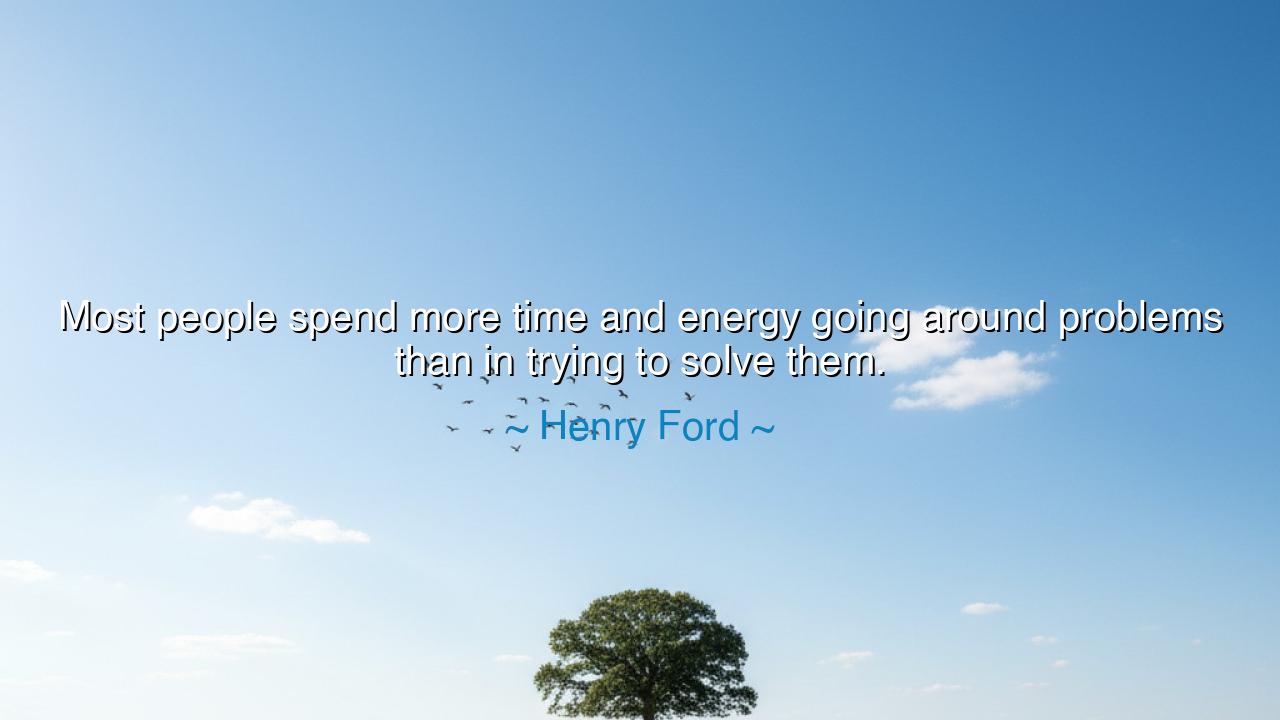
Most people spend more time and energy going around problems
Most people spend more time and energy going around problems than in trying to solve them.






Hear now, O children of the future, the words of Henry Ford, the builder of engines and dreamer of a swifter age: “Most people spend more time and energy going around problems than in trying to solve them.” These words, though born in the age of iron and industry, ring true in every season of humankind. For the problem is the forge of the soul, and the way one confronts it determines whether life becomes a tale of triumph or of endless wandering.
The origin of this saying rests in Ford’s own life. When he sought to bring forth the motorcar for the common man, many around him mocked his vision. Others looked for excuses, saying the challenge was too great, the cost too high, the mechanics too complex. But Ford, with relentless will, faced the problems directly. He labored not to skirt around obstacles, but to master them. In his factories, he devised the assembly line, a solution that transformed difficulty into efficiency and birthed a revolution in labor. Thus he proved his own teaching: energy poured into evasion is wasted, but energy poured into resolution reshapes the world.
History bears witness to the danger of avoiding problems. Consider the fall of the Roman Empire. Its leaders saw corruption in the Senate, decay in discipline, weakness in economy. Instead of confronting these ills, they built diversions—games, spectacles, empty reforms. They went around the problems, but never into their heart. In the end, Rome collapsed, not because the problems were invincible, but because they were never truly solved. The empire crumbled under the weight of avoidance.
Yet, look also to those who embody Ford’s wisdom. Think of Thomas Edison, confronted with the problem of electric light. Thousands of filaments failed him, yet he did not sidestep the task or abandon the pursuit. He pressed forward, each failure a stepping stone. At last, the lightbulb was born, and with it, a dawn for mankind. Edison spent no energy in avoidance, but poured all into solution. This is the spirit Ford praised: the courage to grapple directly with hardship until it yields.
The meaning of Ford’s words is thus twofold: first, that avoidance is more costly than confrontation; second, that the energy we waste in fear, in excuses, in delay, is greater than the energy required to solve the challenge itself. The man who circles the mountain in despair will grow weary and faint, while the one who climbs it, though burdened, reaches the summit. The path of evasion is longer and heavier than the path of courage.
Therefore, let the lesson be this: when you meet a problem, do not shrink back, nor seek detours that lead only to exhaustion. Face it with clarity, strike it with persistence, and you will discover that most obstacles are less monstrous than they seem. To avoid them is to let them grow in shadow; to confront them is to cut them down in light.
Practical actions must follow. When a problem appears, pause not in fear but in inquiry. Ask yourself: what is the heart of this matter? What small step can I take today toward its solution? Break it into pieces, and confront each one. Refuse the temptation of distraction, for it is a thief of strength. Choose instead the harder path of resolution, for though steep, it leads swiftly to freedom.
Thus, carry Ford’s wisdom in your soul: “Most people spend more time and energy going around problems than in trying to solve them.” Let this not be said of you. Be among the few who confront life’s challenges head-on. In doing so, you will find that the world yields its treasures not to those who wander in avoidance, but to those who dare to solve, to endure, and to overcome.






AAdministratorAdministrator
Welcome, honored guests. Please leave a comment, we will respond soon